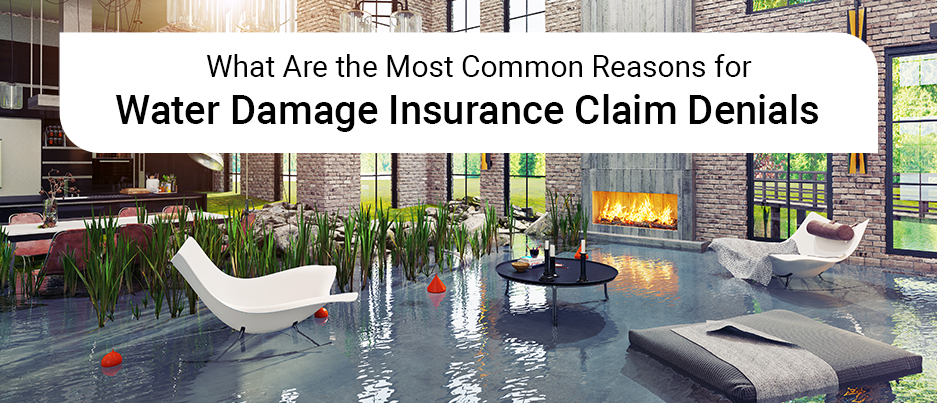Experiencing water damage can impose significant financial and emotional burdens on homeowners. When facing water-related issues, many people turn to their insurance policies for assistance. However, it’s important to understand that not all water damage claims are automatically approved. Insurance companies might reject claims for a variety of reasons, leaving homeowners to bear the costs independently.
In this blog, we’ll explore the most common reasons for water damage insurance claim denials, shedding light on the factors that can affect the outcome of your claim.
15 Reasons for Water Damage Insurance Claim Denials
1. Delayed Reporting:
Delayed reporting is a key factor leading to the denial of water damage insurance claims. If you wait too long to report the incident to your insurance company, they may argue that the delay hindered their ability to assess the damage accurately. For example, if a pipe bursts in your home, it’s crucial to notify your insurance provider promptly.
2. Lack of Maintenance:
Insurance companies often deny claims if they believe the damage resulted from a lack of proper maintenance. For instance, if your roof has been leaking for months due to a missing shingle that you neglected to replace, the insurance company may argue that the damage could have been prevented with routine maintenance.
3. Gradual Damage vs. Sudden Damage:
Insurance policies generally provide coverage for unforeseen and unintentional water damage, such as the bursting of a pipe. However, they may deny claims for gradual damage that occurs over time, such as a slow leak in the plumbing system. It’s essential to distinguish between sudden and gradual damage when filing a claim.
4. Pre-existing Conditions:
If the insurance company determines that the water damage existed before the policy came into effect, they may deny the claim. For example, if you had water damage in your basement before purchasing the insurance policy and failed to disclose it, the claim could be rejected.
5. Flood Damage:
Standard homeowners’ insurance policies usually don’t cover flood damage. If your property experiences water damage due to a flood, you need a separate flood insurance policy. Lack of proper coverage may result in the denial of claims.
6. Negligence and Intentional Damage:
Claims may be denied if the insurance company believes the damage resulted from negligence or intentional actions. For instance, if you purposefully damage your home’s plumbing to make a claim, it constitutes insurance fraud and can lead to denial.
7. Policy Exclusions:
Examining your insurance policy is essential for comprehending the extent of coverage and exclusions. Certain insurance policies might incorporate exclusions for particular forms of water damage, such as harm resulting from sewer backups or rivers overflowing. If the cause of your water damage falls under an exclusion, your claim may be denied.
8. Failure to Mitigate Damage:
Insurance companies expect homeowners to take reasonable steps to mitigate further damage once an incident occurs. Failure to promptly address the issue may result in the insurer rejecting your claim. For example, if a water leak is not fixed promptly, leading to extensive damage, the claim may be rejected.
9. Inaccurate or Incomplete Information:
Furnishing precise and comprehensive details while submitting a claim is of utmost importance. If there are discrepancies or omissions in your claim, the insurance company may use it as grounds for denial. Be thorough and transparent when documenting the details of the incident.
10. Unapproved Repairs:
Before making any repairs, it’s essential to get approval from your insurance company. If you proceed with repairs without their consent, it may result in claim denial. Always consult with your insurer before initiating any restoration work on your property.
11. Unoccupied Homes:
Insurance policies may have clauses regarding unoccupied homes, especially if the damage occurs while the house is vacant. Some policies may impose restrictions on coverage if the property is left unattended for an extended period. It is crucial to be mindful of any restrictions associated with the occupancy of your residence.
12. Mould Infestation:
If water damage leads to mould growth, insurance companies may deny claims if they believe the homeowner did not take prompt action to address the issue. Mould infestations can be considered a result of negligence, especially if the homeowner fails to mitigate water damage effectively.
13. Unapproved Renovations or Modifications:
Making significant changes to your home without informing the insurance company can result in claim denials. If the water damage is related to alterations or renovations that were not approved by the insurer, it may be grounds for denial.
14. Non-Disclosure of Previous Claims:
If you fail to disclose previous water damage claims when obtaining a new insurance policy, it can lead to denials. Insurance providers depend on precise claims records to evaluate risk and establish coverage.
15. Misuse of the Property:
If the insurance company determines that the property was misused or not used for its intended purpose, it could be a reason for claim denials. For instance, if a homeowner uses a residential property for commercial purposes without proper coverage, claims may be rejected.
Conclusion
Understanding the common reasons for water damage insurance claim denials is vital for homeowners in Toronto seeking financial assistance after a water-related incident. Timely reporting, proper maintenance, and adherence to policy terms are crucial factors in ensuring the success of your claim. By being aware of these factors and taking preventive measures, homeowners in Toronto can increase their chances of a successful insurance claim for water damage.


